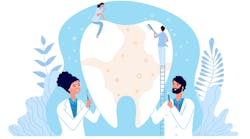The case for dental hygienists’ autonomy: Defining the paradigm
Listen to the article on our podcast!
Part 1 of 6
Visit rdhmag.com/sven to read the entire series.
Friedrich Nietzsche once said, “All seeing is essentially perspective, and so is all knowing.”1 Each person’s view is shaped by their education and experiences, influencing how they perceive the world. Dentistry emphasizes technical expertise, which is a crucial and valued foundation, but one that saturates the field and marks the brand of most writers, consultants, and speakers.
Early in my career, I carved out a niche that honored my unconventional background, pursuing an education in public health, business, and law, a unique trifecta well suited for recognizing patterns, defining problems, and crafting solutions.
Raised in a deeply religious household, I attended a seminary during my high school years. My education focused on philosophy, logic, ethics, epistemology, natural law, and psychology, subjects aimed at uncovering root causes, eliminating distractions, and addressing fundamental issues. This foundation shaped my analytical approach and fueled an appreciation for research and debate. While my parents hoped I would become a minister, my ambition was to become a doctor. Without their moral or financial support, pursuing a medical degree was unattainable, so I defaulted to the family business of dental technology and ultimately earned board certification (CDT).
My desire to become a clinician, combined with industry disruptions during the Great Recession, and a few strategic investments, propelled me toward a career in dental hygiene. I enrolled in an accelerated program in Washington State, the only state that statutorily requires all dental hygiene programs to include education in restorative dentistry and board certification prior to licensure.2 This rigorous training earns graduates the designation of restorative dental hygienist.
Common denominator of tech and hygiene
Laboratory technology and restorative hygiene share a common denominator—both foster mindsets that view the removal of human dentition for prosthetics in a positive light. This perspective subtly instills in technicians and restorative hygienists a mentality that downplays or outright disregards the critical nature of preventive dentistry as the catalyst for controlling and minimizing the burden of oral disease
Unsurprisingly, my initial goal after graduating from hygiene school was to become a dentist. I completed my bachelor’s degree and began working through the necessary prerequisites. However, I paused my studies when I was offered a position as the administrator of a full-mouth rehabilitation clinic in transition to an all-on-four3 practice.
After three years in this area, the relentless fight to uphold ethical principles wore me down. Disgust is the only word that captures my feelings toward the blatant corruption dentists and their consultants shamelessly promoted, peddling half-truths and overdiagnoses to meet financial targets, often at devastating costs to patients. Some were forced to mortgage their homes, borrow from family members, or drain their savings to afford treatment, an issue highlighted in a 2024 CBS news story.4
Disillusioned with dentistry, I refocused my career by earning a master’s degree in public health. This allowed me to reconnect with my core values while exploring access-to-care challenges and the history of dental therapy. While commendable, this approach still overly emphasized restorative care as the solution.
To broaden my perspective, I also completed an MBA and began a third master’s in legal studies before being accepted into a doctoral program. My research now centers on two critical areas: the autonomy of dental hygienists and the feasibility of broadly integrating dental therapy into the US dental system.
Early in my research, I shared my findings with a colleague who made a remark that fundamentally shifted my mindset: “Dentistry is predicated on dental hygiene’s failure.” That statement opened my eyes to the inherently dichotomous relationship between dentists and dental hygienists, a paradigm I had previously overlooked.
Dental hygiene as preventive
A dichotomy, a conflict of interest, opposing ideologies—so many narratives arose from the clarity of that statement. Dental hygiene’s ethos is inherently preventive, centered on preserving dentition and oral function through nonsurgical, minimally invasive approaches designed to stop problems before they ensue. In contrast, dentistry is surgical in nature, relying on the problems to occur.
This distinction explains why hygienists so often resent dentists, why dentists predictably belittle hygienists, and why our associations continuously clash. It also highlights a key driver of professional burnout: no reasonable individual would willingly endure a state of ethical conflict where their diagnosis for preventive therapies is dismissed by a conflicting profession that profits financially from doing so.5,6
At the same time, this clarity opens the door for serious legal discussions. With a clear line drawn between the roles of hygienists and dentists, critical questions emerge: is organized dentistry violating Federal Trade Commission (FTC) regulations? Are they breaking antitrust laws and facing no accountability?
Clarity of definition is essential for meaningful debate; without it, dialogue becomes impossible. Blurred lines hinder laypeople, lawyers, lobbyists, and legislators from understanding and effectively championing our cause. When dental hygiene decisively separates itself from any appearance of encroaching on restorative dentistry, this clarity crystallizes. We are prevention specialists, and we have no interest in a surgical scope. Our distinct profession is vital to public safety, protecting against overdiagnosis and irreversible overtreatment that dentists are predisposed and financially motivated to perform.4,7,8
Antitrust laws: the avenue for advocacy
Antitrust laws, including the Sherman Act, Clayton Act, and FTC Act, were written to ensure fair competition and prevent monopolistic practices.9 These laws prohibit restricting competition, price-fixing, and creating barriers for professionals. Enforced by the FTC, they protect consumer access to quality care and prevent anticompetitive practices. The FTC has frequently scrutinized professional boards for restricting qualified professionals' independence.10-14 Several cases against dental boards are on record,10,12,14 with a notable one reaching the Supreme Court in 2015.15
The American Dental Association (ADA) and complicit dental boards are engaged in restrictive practices that raise serious antitrust and public safety concerns. Their two-pronged approach of controlling the dental hygiene profession, while deliberately undermining it, reveals their only possible motive: industry domination and protecting their members’ economic interests.
The proposal to shift hygienists' responsibilities to assistants is both dangerous and unrealistic.16 While dental assistants play a vital role in the dental workforce, their responsibilities are defined in their title: they assist dentists and hygienists. Treatment and diagnosis fall exclusively within the preventive scope of hygienists and the restorative scope of dentists. Organized dentistry’s premise for this proposal is absurd at face value: with an existing shortage of dental assistants,17 this change could not improve access to care in any meaningful way. It can, however, be viewed as anticompetitive collusion.18
Appropriating hygienists' scope to lower-cost, less-qualified personnel would diminish quality care and displace skilled professionals, consequences that endanger the public and violate antitrust principles. Dental hygienists and advocacy groups should challenge these exploitative policies and expose their anticompetitive nature.
So why hasn’t anything been done?
Organized dentistry’s mob boss mentality, relying on bullying and intimidation tactics against hygienists, has perpetuated this issue.19,20 They count on our silence, driven by fear of losing our livelihoods and ability to support our families. Being blacklisted by dentists effectively makes us unemployable, a tactic some exploit, knowing the financial and emotional strain of legal action is a powerful deterrent.21 I have faced this threat personally and witnessed it many times.
The American Dental Hygienists’ Association (ADHA) may not be perfect, but a new generation of leaders is poised to transform it into the advocacy powerhouse our profession needs. Despite its flaws, it remains our strongest defense against organized attacks from other professional groups. Without unity under a strong association, dentists will continue to control the system, while division and infighting leave us vulnerable to exploitation. Your membership supports the advocacy and legal efforts essential to safeguarding our profession.
I encourage state leaders to critique their dental boards' restrictive controls over hygienists as antitrust violations. We must rebrand our focus to prioritize advocacy, and if we wish to be effective, our peers must see the association as more than a continuing education entity.
Author’s note: Part two of this series will delve into the blatant sexism that male-dominated dentistry wields to maintain control over a predominantly female profession. Future installments will reveal historical evidence of organized dentistry’s long-standing practice of prioritizing its members’ economic interests at the expense of patient health.
Disclaimer: While the author is an active leader in the ADHA and president-elect of Virginia’s chapter, the research and views expressed in this series, though they may align with the association’s policies, do not officially represent the ADHA or its tripartite structure.
Editor's note: This article appeared in the April/May 2025 print edition of RDH magazine. Dental hygienists in North America are eligible for a complimentary print subscription. Sign up here.
References
1. Nietzsche FW. The genealogy of morals. The modern library of the world's best books. Boni and Liveright Inc. 1887.
2. Washington Administrative Code. WAC 246-815-030. 1990. Accessed January 3, 2025. https://app.leg.wa.gov/wac/default.aspx?cite=246-815&full=true#246-815-020
3. Patzelt SBM, Bahat O, Reynolds MA, Strub JR. The all-on-four treatment concept: a systematic review. Clin Implant Dent Relate Res. 2014;16(6):836-855. doi:10.1111/cid.12068
4. Kelman B, Werner A. Dentists are pulling healthy and treatable teeth to profit from implants, experts warn. CBS News. 2024. Accessed January 3, 2025. https://www.cbsnews.com/news/dental-implants-increasing-profit-experts/
5. McCombs G, Tolle SL, Newcomb T, Bruhn AM, Hunt AW, Stafford LK. Workplace bullying: a survey of Virginia dental hygienists. J Dent Hyg. 2018;92(5):22-29.
6. Carr MP. Ethical decision making in dental hygiene. Dim Dent Hyg. May 1, 2017. https://dimensionsofdentalhygiene.com/article/ethical-decision-making-dental-hygiene/
7. Hirata R, Sampaio CS, de Andrade OS, Kina S, Goldstein RE, Ritter AV. Quo vadis, esthetic dentistry? Ceramic veneers and overtreatment–a cautionary tale. J Esth Restor Dent. 2022;34(1):7-14. doi: 10.1111/jerd.12838
8. Nadanovsky P, Pires dos Santos AP, Nunan D. Too much dentistry. JAMA Int Med. 2024;184(7):713-714. doi:10.1001/jamainternmed.2024.0222
9. The antitrust laws. Federal Trade Commission. 2024. Accessed January 10, 2025. https://www.ftc.gov/advice-guidance/competition-guidance/guide-antitrust-laws/antitrust-laws
10. FTC approves final order requiring Alabama Board of Dental Examiners to stop unreasonably excluding lower-cost online and teledentistry providers from competing. Federal Trade Commission. 2021. Accessed January 10, 2025. https://www.ftc.gov/news-events/news/press-releases/2021/12/ftc-approves-final-order-requiring-alabama-board-dental-examiners-stop-unreasonably-excluding-lower
11. Federal Trade Commission closes investigation of Texas Medical Board after Texas passes law expanding telemedicine and telehealth services. Federal Trade Commission. 2017. Accessed January 10, 2025. https://www.ftc.gov/news-events/news/press-releases/2017/06/federal-trade-commission-closes-investigation-texas-medical-board-after-texas-passes-law-expanding
12. Appeals court affirms FTC ruling that North Carolina Dental Board illegally stifled competition in teeth whitening. Federal Trade Commission. 2013. Accessed January 10, 2025. https://www.ftc.gov/news-events/news/press-releases/2013/06/appeals-court-affirms-ftc-ruling-north-carolina-dental-board-illegally-stifled-competition-teeth
13. FTC staff: Mississippi bill that would give State Pharmacy Board authority over PBMs likely to increase prescription drug costs and reduce competition. Federal Trade Commission. 2011. Accessed January 15, 2025. https://www.ftc.gov/news-events/news/press-releases/2011/03/ftc-staff-mississippi-bill-would-give-state-pharmacy-board-authority-over-pbms-likely-increase
14. In the matter of South Carolina State Board of Dentistry. Federal Trade Commission. 2007. Accessed January 15, 2025. https://www.ftc.gov/legal-library/browse/cases-proceedings/0210128-south-carolina-state-board-dentistry-matter
15. North Carolina State Board of Dental Examiners v. FTC. Harvard Law Review. 2015. Accessed January 15, 2025. https://harvardlawreview.org/print/vol-129/north-carolina-state-board-of-dental-examiners-v-ftc-2/
16. ADHA position statement on the Dental Access Model Act. American Dental Hygienists' Association. 2024. Accessed January 20, 2025. https://www.adha.org/advocacy/adha_positions_papers/
17. Economic outlook and emerging issues in dentistry. American Dental Association. November 13, 2023. Accessed January 20, 2025. https://www.ada.org/-/media/project/ada-organization/ada/ada-org/files/resources/research/hpi/nov2023_hpi_economic_outlook_denitstry_report_main.pdf?
18. Anticompetitive practices. Federal Trade Commission. 2024. Accessed January 20, 2025. https://www.ftc.gov/enforcement/anticompetitive-practices
19. Jordan M. The unexpected political power of dentists. The Washington Post. July 1, 2017. Accessed January 22, 2025. https://www.washingtonpost.com/politics/the-unexpected-political-power-of-dentists/2017/07/01/ee946d56-54f3-11e7-a204-ad706461fa4f_story.html
20. Giles B. Hygienists brace for pitched battles with dentists in fight over practice laws. Kaiser Health News. October 19, 2021. Accessed January 22, 2025. https://khn.org/news/article/hygienists-brace-for-pitched-battles-with-dentists-in-fights-over-practice-laws/
21. Schram VH. Getting past getting canceled: how one RDH fought back. DentistryIQ. February 15, 2022. https://www.dentistryiq.com/dental-hygiene/article/14233886/getting-past-getting-canceled-how-one-rdh-fought-back
About the Author

Derik J. Sven, MBA, MPH, RDH, CDT, FADHA
Derik has nearly two decades of experience as a board-certified lab tech and restorative hygienist. He holds undergraduate degrees in dental hygiene and health care administration, as well as master’s degrees in public health and business administration. He’s currently pursuing his doctorate in health science at George Washington University School of Medicine in Washington, DC, where his research focuses on advancing the autonomy of dental hygienists and the broad integration of dental therapists into the health-care system. He’s an inaugural fellow of the ADHA and president of Virginia's chapter.


